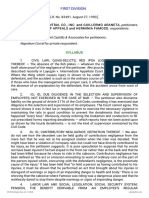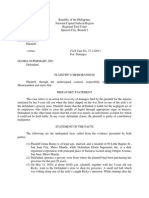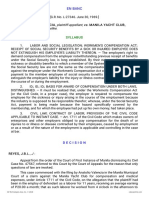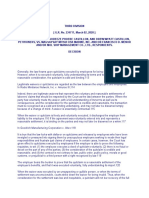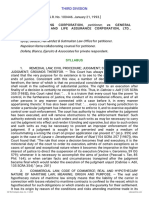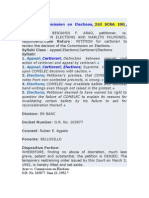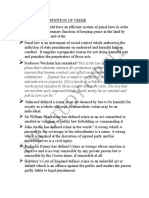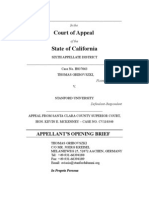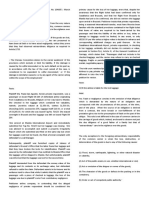Ma-AO VS CA
Ma-AO VS CA
Uploaded by
lawboyCopyright:
Available Formats
Ma-AO VS CA
Ma-AO VS CA
Uploaded by
lawboyOriginal Description:
Copyright
Available Formats
Share this document
Did you find this document useful?
Is this content inappropriate?
Copyright:
Available Formats
Ma-AO VS CA
Ma-AO VS CA
Uploaded by
lawboyCopyright:
Available Formats
. Ma-ao Sugar Central Co., Inc. vs.
Court of Appeals, 189 SCRA 88 , August 27, 1990
Case Title : MA-AO SUGAR CENTRAL CO., INC. and GUILLERMO ARANETA, petitioners, vs. HON. COURT OF APPEALS and HERMINIA FAMOSO, respondents.Case Nature : PETITION to review the decision of the Court of Appeals. Syllabi Class : Civil Law|Damages|Negligence|Workmens Compensation Act Syllabi: 1. Civil Law; Damages; Negligence; Petitioner should have taken more prudent steps to prevent such accidents instead of waiting until a life was finally lost; Case at bar.+ 2. Civil Law; Damages; Doctrine of the res ipsa loquitur. + 3. Civil Law; Damages; Contributory negligence, defined.+ 4. Civil Law; Damages; Workmens Compensation Act; Payment of SSS benefits to the employee would not wipe out or extinguish the employers liability for the injury or illness contracted by his employee. + Division: FIRST DIVISION Docket Number: G.R. No. 83491 Counsel: Jalandoni, Herrera, Del Castillo & Associates, Napoleon Corral Ponente: CRUZ Dispositive Portion: WHEREFORE, the appealed decision is AFFIRMED intoto. The petition is DENIED, with costs against the petitioner.
Ma-ao Sugar Central Co., Inc. vs. Court of Appeals G.R. No. 83491. August 27, 1990.* MA-AO SUGAR CENTRAL CO., INC. and GUILLERMO ARANETA, petitioners, vs. HON. COURT OF APPEALS and HERMINIA FAMOSO, respondents. Civil Law; Damages; Negligence; Petitioner should have taken more prudent steps to prevent such accidents instead of waiting until a life was finally lost; Case at bar.There is no question that the maintenance of the rails, for the purpose inter alia of preventing derailments, was the responsibility of the petitioner, and that this responsibility was not discharged. According to Jose Treyes, its own witness, who was in charge of the control and supervision of its train operations, cases of derailment in the milling district were frequent and there were even times when such derailments were reported every hour. The petitioner should therefore have taken more prudent steps to prevent such accidents instead of waiting until a life was finally lost because of its negligence. Same; Same; Doctrine of the res ipsa loquitur.At any rate, the absence of the fish plates whatever the cause or reasonis by itselfalone proof of the negligence of the petitioner. Res ipsa loquitur. The doctrine was described recently in Layugan v.
Intermediate Appellate Court, thus: Where the thing which causes injury is shown to be under the management of the defendant, and the accident is such as in the ordinary course of things does not happen if those who have the management use proper care, it affords reasonable evidence, in the absence of an explanation by the defendant, that the accident arose from want of care. Same; Same; Same; Contributory negligence, defined.Contributory negligence has been defined as the act or omission amounting to want of ordinary care on the part of the person injured which, concurring with the defendants negligence, is the proximate cause of the injury. It has been held that to hold a person as having contributed to his injuries, it must be shown that he performed an act that brought about his injuries in disregard of warnings or signs of an impending danger to health and body. There is no showing that the caboose where Famoso was riding was a dangerous place and that he recklessly dared to stay there despite warnings or signs of impending _______________ * FIRST DIVISION. 89 VOL. 189,AUGUST 27, 1990 89 Ma-ao Sugar Central Co., Inc. vs. Court of Appeals danger. Same; Same; Same; Workmens Compensation Act; Payment of SSS benefits to the employee would not wipe out or extinguish the employers liability for the injury or illness contracted by his employee.As observed by Justice J.B.L. Reyes in the case of Valencia v. Manila Yacht Club, which is still controlling: x x x By their nature and purpose, the sickness or disability benefits to which a member of the System may be entitled under the Social Security law (Rep. Act No. 1161, as amended by Rep. Acts Nos. 1792 and 2658) are not the same as the compensation that may be claimed against the employer under the Workmens Compensation Act or the Civil Code, so that payment to the member employee of social security benefits would not wipe out or extinguish the employers liability for the injury or illness contracted by his employee in the course of or during the employment. It must be realized that, under the Workmens Compensation Act (or the Civil Code, in a proper case), the employer is required to compensate the employee for the sickness or injury arising in the course of the employment because the industry is supposed to be responsible therefore; whereas, under the Social Security Act, payment is being made because the hazard specifically covered by the membership, and for which the employee had put up his own money, had taken place. [Ma-ao Sugar Central Co., Inc. vs. Court of Appeals, 189 SCRA 88(1990)]
You might also like
- Legal Environment of Business 13th Edition Meiners Solutions Manual Download100% (22)Legal Environment of Business 13th Edition Meiners Solutions Manual Download25 pages
- In The United States Court of Appeals For The Fifth CircuitNo ratings yetIn The United States Court of Appeals For The Fifth Circuit7 pages
- Ma-Ao Sugar Central Co., Inc. vs. Court of AppealsNo ratings yetMa-Ao Sugar Central Co., Inc. vs. Court of Appeals11 pages
- Torts - A39 - de Guzman vs. National Labor Relations Commission, 211 SCRA 723 (1992)No ratings yetTorts - A39 - de Guzman vs. National Labor Relations Commission, 211 SCRA 723 (1992)13 pages
- En Banc: Tito M. Villaluna For RespondentsNo ratings yetEn Banc: Tito M. Villaluna For Respondents3 pages
- National Power Corporation vs. Heirs of Noble CasionanNo ratings yetNational Power Corporation vs. Heirs of Noble Casionan17 pages
- Ma-Ao Sugar Central Co., Inc. vs. Hon. Court of AppealsNo ratings yetMa-Ao Sugar Central Co., Inc. vs. Hon. Court of Appeals2 pages
- National Power Corporation vs. Heirs of Noble CasionanNo ratings yetNational Power Corporation vs. Heirs of Noble Casionan9 pages
- Floresca - v. - Philex - Mining - Corp PDFNo ratings yetFloresca - v. - Philex - Mining - Corp PDF26 pages
- Malayan Insurance Co., Inc. vs. Court of AppealsNo ratings yetMalayan Insurance Co., Inc. vs. Court of Appeals8 pages
- Sarmiento vs. ECC GR No. 65680, May 11, 1988No ratings yetSarmiento vs. ECC GR No. 65680, May 11, 19883 pages
- 21 Gatchalian v. Delim, G.R. No. 56487, (October 21, 1991)No ratings yet21 Gatchalian v. Delim, G.R. No. 56487, (October 21, 1991)14 pages
- Petitioners vs. vs. Respondents Jalandoni, Herrera, Del Castillo & Associates Napoleon CorralNo ratings yetPetitioners vs. vs. Respondents Jalandoni, Herrera, Del Castillo & Associates Napoleon Corral7 pages
- D.1. G.R. No. L-30642 - Floresca v. Philex Mining CorpNo ratings yetD.1. G.R. No. L-30642 - Floresca v. Philex Mining Corp27 pages
- Civil Aeronautics Administration vs. Court of Appeals 167 SCRA 28, November 08, 1988No ratings yetCivil Aeronautics Administration vs. Court of Appeals 167 SCRA 28, November 08, 19887 pages
- 14. Pioneer Insurance v CA, GR 84197, 28 July 1989, 175 SCRA 668No ratings yet14. Pioneer Insurance v CA, GR 84197, 28 July 1989, 175 SCRA 66814 pages
- G.R. No. 172682 Suplicio Lines Vs Sesante Transpo READNo ratings yetG.R. No. 172682 Suplicio Lines Vs Sesante Transpo READ29 pages
- REYNALDA GATCHALIAN v. ARSENIO DELIM, ET AL. G.R. No. 56487 October 21, 1991 PDF100% (1)REYNALDA GATCHALIAN v. ARSENIO DELIM, ET AL. G.R. No. 56487 October 21, 1991 PDF8 pages
- Plaintiff-Appellant vs. vs. Defendant-Appellee: en BancNo ratings yetPlaintiff-Appellant vs. vs. Defendant-Appellee: en Banc4 pages
- 124138-1998-Metro Manila Transit Corp. v. Court ofNo ratings yet124138-1998-Metro Manila Transit Corp. v. Court of18 pages
- G.R. No. 84197 - Pioneer Insurance and Surety CorNo ratings yetG.R. No. 84197 - Pioneer Insurance and Surety Cor14 pages
- Petitioner vs. vs. Respondents: Third DivisionNo ratings yetPetitioner vs. vs. Respondents: Third Division12 pages
- Petitioner vs. vs. Respondents: Third DivisionNo ratings yetPetitioner vs. vs. Respondents: Third Division12 pages
- 144 Supreme Court Reports Annotated: Perla Compania de Seguros, Inc. vs. AnchetaNo ratings yet144 Supreme Court Reports Annotated: Perla Compania de Seguros, Inc. vs. Ancheta8 pages
- Case #18 Floresca V Philex Mining GR No L-30642No ratings yetCase #18 Floresca V Philex Mining GR No L-3064222 pages
- 7) Ty Vs First National Surety and Assurance CoNo ratings yet7) Ty Vs First National Surety and Assurance Co4 pages
- Tai Tong Chuache - Co. vs. Insurance Commission, 158 SCRA 366 (1988)No ratings yetTai Tong Chuache - Co. vs. Insurance Commission, 158 SCRA 366 (1988)13 pages
- "Volunti Non Fit Injuria" Is A Latin Maxim, On Literal Translation, MeansNo ratings yet"Volunti Non Fit Injuria" Is A Latin Maxim, On Literal Translation, Means6 pages
- Petitioner vs. vs. Respondent Sycip, Salazar, Hernandez & Gatmaitan Law Office Napoleon Rama Dollete, Blanco, Ejercito & AssociatesNo ratings yetPetitioner vs. vs. Respondent Sycip, Salazar, Hernandez & Gatmaitan Law Office Napoleon Rama Dollete, Blanco, Ejercito & Associates11 pages
- United States Court of Appeals, Fifth CircuitNo ratings yetUnited States Court of Appeals, Fifth Circuit7 pages
- Pleasantville Development Corporation Vs CA ScraNo ratings yetPleasantville Development Corporation Vs CA Scra2 pages
- Gotesco Investment Corporation Vs Chatto ScraNo ratings yetGotesco Investment Corporation Vs Chatto Scra2 pages
- Apple Premium Reseller: Ultimate MAC GalleryNo ratings yetApple Premium Reseller: Ultimate MAC Gallery8 pages
- Third Eye Blind Inc V Near North Entertainment Ins Services LLC100% (1)Third Eye Blind Inc V Near North Entertainment Ins Services LLC12 pages
- Ivler V Judge San Pedro GR No 172716 11172010No ratings yetIvler V Judge San Pedro GR No 172716 1117201014 pages
- Implant Caselaw Bonus Materials For Donors To Barbara Lindsey Implant Case Learn MoreNo ratings yetImplant Caselaw Bonus Materials For Donors To Barbara Lindsey Implant Case Learn More68 pages
- Case 43 Sabena-Belgian-World-Airlines-v-CANo ratings yetCase 43 Sabena-Belgian-World-Airlines-v-CA2 pages
- Looney v. Moore: Opinion Granting Defendants' Motion For Summary Judgment To Defendants in SUPPORT Study LawsuitNo ratings yetLooney v. Moore: Opinion Granting Defendants' Motion For Summary Judgment To Defendants in SUPPORT Study Lawsuit15 pages















